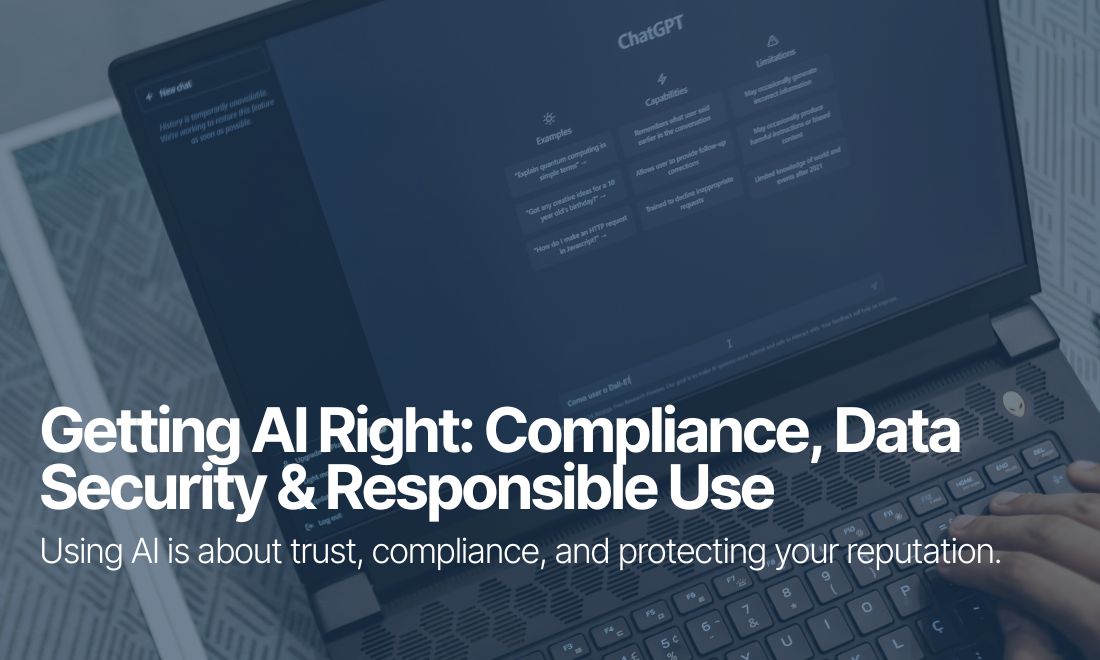AI is transforming how businesses operate, from marketing automation to smarter customer service, content creation, and strategic forecasting. But with that power comes responsibility. For forward-thinking organisations, using AI well isn’t just about performance, it’s about trust, compliance, and protecting your reputation.
At Think Menai, we help clients unlock the benefits of AI safely. Here’s how to ensure your adoption of AI is not only effective but ethically sound and legally compliant.
1. Understand Your Data Obligations
First, let’s talk data because AI is only as good (or risky) as the data it handles.
Most AI tools today rely on feeding in customer data, behavioural insights, or even internal documents. That immediately brings GDPR and data protection laws into scope.
Key considerations:
- Do you know what data is going in?
- Does the tool store or learn from it?
- Are you in control of how long it’s retained?
If the answer to any of those is unclear, you’re exposed. Every business using AI should complete a Data Protection Impact Assessment (DPIA) for new tools, especially anything customer-facing.
And be wary of using free or experimental tools to process real user data. It’s tempting, but that convenience could cost you compliance.
2. Use the Right Tools and Read the Fine Print
Not all AI tools are created equal. Some are built for enterprise-grade use, others for casual experimentation. You’ll want to look for platforms that:
- Offer clear data handling policies
- Allow you to opt out of data sharing or model training
- Provide audit logs or access histories
- Integrate with your existing security stack
Always check where your data is processed (UK, EU, US?) and whether it’s encrypted in transit and at rest. If you're a UK business handling client data, your AI vendors need to meet the same standards as your other suppliers.
At Think Menai, we help clients choose tools that fit not just their goals, but their governance frameworks.
3. Keep Humans in the Loop
AI should assist, not replace, critical thinking especially when decisions impact customers or staff. Whether it’s content generation, recruitment filtering, or decision support, keep a human-in-the-loop approach.
That means:
- Reviewing AI outputs before publishing
- Avoiding full automation in sensitive areas
- Being transparent about where AI is used
If you’re using AI in customer-facing workflows, clear disclosure builds trust. A line that says “This response was assisted by AI” goes a long way.
4. Document Your Use and Your Intent
One of the smartest things you can do? Create a lightweight AI usage policy. Even a one-pager that explains:
- What tools are in use
- Who is allowed to use them
- What types of data are in scope
- Where AI is being deployed
This isn’t bureaucracy, it’s protection. If regulators or clients ever ask, you’ll have a clear answer ready.
5. Build for Reputation, Not Just ROI
The fastest-growing companies in AI aren't the flashiest, they're the most trusted. Clients and customers want innovation, but they want to know you’ve done your due diligence.
At Think Menai, we help you deploy AI with a strategy-first mindset. That means choosing tools wisely, setting clear ethical boundaries, and staying one step ahead of regulation to ensure compliance. Because the future of AI won’t just be about what you can do. It’ll be defined by how responsibly you choose to do it.

